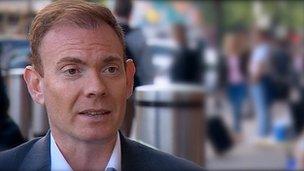Horsemeat scandal 'could happen again' warns expert
- Published
With cuts to food inspection and reports of increasing fraud, can the public be confident the food we eat is what we think it is?
A drop in the number of food samples sent for testing could lead to a repeat of the horsemeat scandal, an expert has told BBC Inside Out.
Figures obtained from the Food Standards Agency (FSA) show reports of food fraud have risen.
At the same time fewer food samples are being analysed by trading standards.
In the wake of the horsemeat scandal a National Audit Office report, external published on Thursday criticised the "confusion" surrounding food policy.
It said a 2010 reorganisation had blurred the division of responsibilities between the Department for Environment, Food and Rural Affairs (Defra) and the FSA.
'Prepared to cut corners'
Local authorities use their trading standards teams to test foods for authenticity - the results are then passed on to the FSA.
According to annual reports by the FSA, the number of food samples sent for analysis in England has dropped by 30%, from 74,702, external in 2009-10 to 52,186, external in 2011-12.
Andrew Foster, from the Trading Standards Institute, said the drop was due to cuts to local authority trading standards teams.
He said: "We've lost a third of our inspectorate and talking to colleagues recently they are expecting to slash by a further 60% in some cases."
He said there was a risk that within three years there would be no trading standards teams in some areas.
"In my view the horsemeat scandal could happen again," he said.
"There's always somebody, particularly in times of austerity, prepared to cut corners.
"And when we're faced with an inspectorate that is creaking and is fragmented - that's a perfect opportunity for someone to exploit those divisions."
In January Irish food inspectors announced they had found horsemeat in frozen beefburgers made in Ireland and the UK.
The scandal grew as stores and companies across Europe began removing products after finding horsemeat.
'Wake-up call'
The FSA said reports of food fraud - which can include deliberately mislabelling products or selling food which is unfit for consumption - had risen from 899 in 2010 to 1,385 in 2012.
Early indications for the first six months of 2013, when the horsemeat scandal first emerged, show reports of fraud have risen by 28% compared with the same period the previous year.

Andrew Foster from the Trading Standards Institute has warned of food fraud increasing during austerity
Andrew Rhodes, who is the chief operating officer at the FSA, said he did not believe the horsemeat scandal was a "wake-up call".
"This is an area in terms of food authenticity that we've been working on with local authorities for many years," he said.
"This incident is one that has really raised the public awareness about authenticity and about thinking what is in your food."
Dr Mark Woolfe, who is the former head of authenticity at the FSA, said the agency relied on local authority tests results to operate effectively.
He said: "The amount of sampling that [local authorities] are doing has been quite severely reduced, so I think the whole system is really quite severely weakened."
Inside Out is broadcast on BBC One England at 19:30 BST and nationwide on the iPlayer for seven days thereafter.
- Published10 October 2013
- Published14 February 2013
- Published10 April 2013
- Published15 February 2013